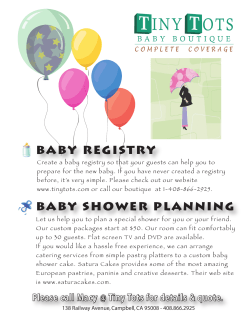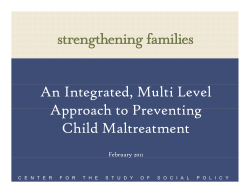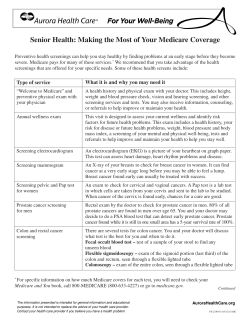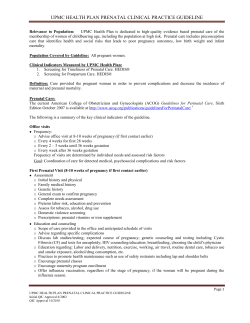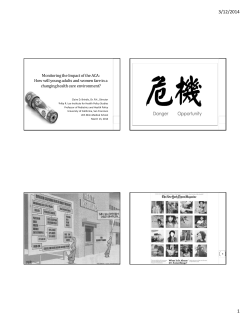
FOR WOMEN AND THEIR FAMILIES
FOR WOMEN AND THEIR FAMILIES A guide to understanding prenatal screening tests for: • Down Syndrome • Trisomy 18 • Open Neural Tube Defects New prenatal screening tests are now available for all women. Early on in your pregnancy, you can decide whether or not you would like to have prenatal screening. These tests are optional - it is your choice whether or not to have them. The purpose of this Guide is to give you information to help with your decision. What are prenatal screening tests? • These are blood tests, sometimes with an ultrasound, which are done starting at 11 weeks of pregnancy. • They are SCREENING tests, which means they tell you your CHANCE of having a baby with Down syndrome, trisomy 18 or an open neural tube defect. • Screening tests cannot tell you for sure whether or not your baby has one of these three conditions, only the chance of this. • To find out for sure, you would have to decide whether to have a DIAGNOSTIC test (see page 10). • Prenatal screening cannot find every birth defect. The Conditions: • Down Syndrome • Trisomy 18 • Open Neural Tube Defects Down syndrome* People with Down syndrome usually have mild to moderate intellectual delay. Individuals with Down syndrome may have a greater incidence of health conditions than the average person such as heart, stomach, bowel, thyroid, vision and hearing problems. Treatment is available for many of these conditions. Each person with Down syndrome is different. There is no way to test how serious the disabilities will be. People with Down syndrome generally live into their fifties. In general, about one in 1000 births has Down syndrome. The chance of having a child with Down syndrome increases with the mother’s age. Trisomy 18* Babies with trisomy 18 have both mental and physical disabilities. Many pregnancies with trisomy 18 will miscarry. Most babies born with trisomy 18 do not survive past the first few months of life. In general about one in 6,000 births has trisomy 18. The chance of having a child with trisomy 18 increases with the mother’s age. Open Neural Tube Defects* These conditions occur when the brain or spinal cord does not form properly. An open neural tube defect involving the spinal cord is called spina bifida. Spina bifida causes physical disabilities such as difficulty walking, and controlling the bladder and/or bowel. People with spina bifida may also have mental disabilities. Treatment can help with many of the physical disabilities. An open neural tube defect involving the brain is called anencephaly. A baby with anencephaly will be stillborn or die shortly after birth. In Canada, the chance of having a baby with an open neural tube defect is about 1 out of every 2000 births. The chance of a child being born with this condition does not increase with the mother’s age. * A list of resources on page 11 can lead you to more information about Down syndrome, Trisomy 18 or Open Neural Tube Defects. Family history: Other tests or genetic counselling may be suggested if you or your partner have a close family member who was born with a birth defect or has a serious health problem. Please talk to your health care provider for more information. 2 A guide to understanding prenatal screening tests - for women and their families What are your chances of having a baby with one of these conditions? It is important to remember that most babies are born healthy. The chance of having a baby with a chromosome condition like Down syndrome and trisomy 18 increases with the age of the mother as shown in the Table below. Chance of chromosome conditions with varying maternal age: Mother’s age (years) Chance of Down syndrome Chance of any chromosome condition including trisomy 18, Down Syndrome and others 20 1 in 1,650 1 in 530 25 1 in 1,250 1 in 480 30 1 in 950 1 in 390 35 1 in 385 1 in 180 40 1 in 100 1 in 65 45 1 in 30 1 in 19 Every woman, no matter what age, has a 2-3% chance (2 or 3 chances in 100) of having a baby with some kind of birth defect. Birth defects can include conditions like heart problems and extra toes. Remember… You might decide to have prenatal screening because you want to find out your chance of having a baby with Down syndrome, trisomy 18 or open neural tube defect. This is determined from your age, the blood tests and/or ultrasound. A screening test gives you more information about your chance of having a baby with one of these conditions than the chance shown in the table above. 3 Are Prenatal Screening Tests right for you? Many women have a difficult time deciding whether or not to have prenatal screening tests. Some women find it helpful to read all of this Guide first, before making a decision. Remember, it is your choice whether or not to have a prenatal screening test. Here are some things to think about that might help you make your decision and maybe discuss with your partner, health care provider, family or friends. 1. Do you want to know the chance of your baby having Down syndrome, trisomy 18 or open neural tube defect? •There is no cure for Down syndrome, trisomy 18 or open neural tube defect. •If one of these conditions is found, your health care provider may suggest additional tests and/or change in the way your baby is delivered. •Some people have screening because they would like the information before birth, or would like to prepare for a child with special needs. •Some people have screening because they would consider giving the baby up for adoption if their baby was found to have one of these conditions. •Some people have screening because they would have an abortion if their baby was found to have one of these conditions. 2. How will this information affect your feelings throughout your pregnancy? •Many women worry if their test results say that the chance of having a baby with one of these conditions is higher than expected (called screen positive see page 8). 3. If your screening test result says the chance is higher than expected (called screen positive see page 8), you will need to decide if you want diagnostic testing (see page 10) to find out for sure if your baby has Down syndrome, trisomy 18 or open neural tube defect. 4. Diagnostic testing will tell for sure if your baby has one of these conditions, but has a small chance of miscarriage. Are you willing to take that risk? For information about diagnostic testing see page 10. 5. If more testing shows your baby has a condition for sure, what will you do with the information? You will need to decide if you want to continue the pregnancy or have an abortion. 6. If you find out for sure that your baby has a condition like Down syndrome, you can plan for the birth of your child and find out from others what it is like to raise a child with this condition. Would this information be helpful to you before birth? Remember, to know for sure you have to have a diagnostic test which has a small chance of miscarriage. 7. If you have a child with mental and/or physical disabilities, how might this affect your life, your other children, your relationship with your partner and your extended family? Other things to think about: •Screening tests will find most babies with Down syndrome, trisomy 18 or open neural tube defects, but not all. For more information see page 8. •Screening tests will not find every kind of birth defect, no test can do this. •Prenatal screening tests might also find conditions other than Down syndrome, trisomy 18 and open neural tube defects but these are the commonest. 4 A guide to understanding prenatal screening tests - for women and their families Do you want to have prenatal screening or not? The choice is yours. Decisions you may need to make: If you are UNDECIDED about prenatal screening: You may want to read all of this Guide before making a decision. You can discuss your options with your health care provider or genetic counsellor. You can have prenatal screening and make a choice whether or not to continue the process at each step. If you decide YES to prenatal screening: If you decide NO to prenatal screening: You will need to decide with your health care provider which prenatal screening test is right for you (see page 6) You may have decided that you don’t want to know if your baby has one of these conditions, you would prefer to “take what comes”. If your prenatal screening test is screen POSITIVE, you will need to decide if you will have diagnostic testing, keeping in mind that there is a small risk of miscarriage. You may have decided that you would not want to have a diagnostic test under any circumstances because of the small chance of miscarriage. If you decide YES to diagnostic testing: You will need to decide what you will do if the result shows your baby has one of these conditions. Will you have an abortion? Will you continue the pregnancy? Will you give the baby up for adoption? You may have decided that you would not have an abortion if diagnostic testing confirmed that your baby had one of these conditions. If you are over 35 years of age at your due date: •You need to decide if you would prefer diagnostic testing which can tell for sure if your baby has one of these conditions but has a risk of miscarriage, or… •If you would prefer to have prenatal screening first and make a decision about diagnostic testing depending on the screening test results. For women over 35 years of age at their due date: Women 35 years of age and over at their due date can decide not to have a prenatal screening test but go directly to diagnostic testing such as CVS and amniocentesis. Remember that screening tests give a better estimate of risk than age alone, for those aged 35 to 39. In particular, women 40 and over should consider counselling about the pros and cons of screening and diagnostic testing. For more information about diagnostic testing see page 10 and talk to your health care provider. In some areas, this has changed and applies to women 40 years of age and over at their due date. 5 I have decided that I want to have prenatal screening, now what? You need to choose a prenatal screening test with your health care provider. The following table will help you understand the different prenatal screening tests. If your first visit with your health care provider is before 14 weeks (3-1/2 months) of pregnancy: • You can have one of the new prenatal screening tests: First Trimester Screening, Integrated Prenatal Screening or Serum Integrated Prenatal Screening. • The steps involved in each of these tests and their accuracy are described in the table below. Test/Procedure First Trimester Screening (FTS) Integrated Prenatal Screening (IPS) Serum Integrated Prenatal Screening (SIPS) 1st blood sample 11 - 14 weeks 11 - 14 weeks 11 - 14 weeks Nuchal translucency ultrasound 11 - 14 weeks 11 - 14 weeks NONE 2nd blood sample NONE 15 - 20 weeks 15 - 20 weeks Results available at: 12 - 15 weeks 16 - 21 weeks 16 - 21 weeks Detection rate (Accuracy) Of every 100 pregnancies with Down syndrome, about 80-85 will be detected (80-85%) Of every 100 pregnancies with Down syndrome, about 85-90 will be detected (85-90%) Of every 100 pregnancies with Down syndrome, about 80-90 will be detected (80-90%) False positive rate About 3 to 9 out of 100 pregnancies (3-9%) About 2 to 4 out of 100 pregnancies (2-4%) About 2 to 7 out of 100 pregnancies (2-7%) Diagnostic test if prenatal screening test is positive CVS 11 - 13 weeks Amniocentesis 15 - 22 weeks Amniocentesis 15 - 22 weeks Diagnostic test results available at: 13 - 15 weeks 17 - 24 weeks 17 - 24 weeks Abortion – if you decide to have this – could be performed at: 13 - 23 weeks 17 - 23 weeks 17 - 23 weeks Or:Continuation with pregnancy Birth Birth Birth If CVS is not available, you could have amniocentesis diagnostic testing as described in the next column ➔ Abortion timing will depend on local availability Abortion timing will depend on local availability Abortion timing will depend on local availability FTS offers the earliest available results but requires a blood test for neural tube defects later in the pregnancy. FTS is not available in all communities. Please check with your health care provider. IPS and SIPS are a little more accurate than FTS and include screening for neural tube defects, but this is a 2-step process and results are available later in the pregnancy. Nuchal Translucency (NT) ultrasound is available in most mid-size or larger cities. If you live in an area where this special ultrasound is not available, you can still have SIPS. Nuchal Translucency is a fluid-filled space at the back of every baby’s neck. An ultrasound to measure this is done between 11 and 14 weeks of pregnancy. The chance of a condition, like Down syndrome, is higher when the NT measurement is larger than expected. 6 A guide to understanding prenatal screening tests - for women and their families If your first visit with your health care provider is after 14 weeks (3-1/2 months) of pregnancy: • You can have Triple or Quadruple prenatal screening. In most areas triple screening has been replaced by quadruple screening because it is a little more accurate. • The steps involved in each of these tests and their accuracy are described in the table below. Test Triple Screening Quadruple Screening Blood sample 15 - 20 weeks 15 - 20 weeks Results available at: 16 - 21 weeks 16 - 21 weeks Detection rate (Accuracy) Of every 100 pregnancies with Down syndrome, about 70 will be detected (70%) Of every 100 pregnancies with Down syndrome, about 75 to 85 will be detected (75-85%) False positive rate About 7 out of 100 pregnancies (7%) About 5 to 10 out of 100 pregnancies (5-10%) Diagnostic test if prenatal screening test is positive Amniocentesis 15 - 22 weeks Amniocentesis 15 - 22 weeks Diagnostic test results available at: 17 - 24 weeks 17 - 24 weeks Abortion – if you decide to have this – could be performed at: 17 - 23 weeks 17 - 23 weeks Or: Continuation with pregnancy Birth Birth Abortion timing will depend on local availability Abortion timing will depend on local availability How accurate are prenatal screening tests? Down syndrome The detection and false positive rates in the table only refer to Down syndrome. This is because trisomy 18 is rare and we do not have exact numbers for it. Trisomy 18 Generally, for all of the tests listed, the detection rate or accuracy is less for trisomy 18 than what it is for Down syndrome. Said another way, these tests are not quite as good at measuring the chance of having a baby with trisomy 18 (detection rate) as measuring the chance of having a baby with Down syndrome. Open neural tube defects Screening for open neural tube defects consists of a blood test done between 15-20 weeks. This is done as part of IPS, SIPS, Quad or Triple screening or as an additional blood test if a woman is having FTS. The ultrasound done at about 18 weeks of pregnancy also gives information about open neural tube defects. Of every 100 pregnancies with an open neural tube defect, 80 (or 80%) will be detected with prenatal screening. Remember that most babies are born healthy. 7 Understanding your results: OOOOOOOOOOOOOOOO OOOOOOOOOOOOOOOO OOOOOOOOOOOOOOOO OOOOOOOOOOOOOOOO OOOOOOOOOOOOOOOO OOOOOOOOOOOOOOOO OOOOOOOOOOOOOOOO OOOOOOOOOOOOOOOO OOOOOOOOOOOOOOOO OOOOOOOOOOOOOOOO OOOOOOOOOOOOOOOO OOOOOOOOOOOOOOOO OOOOOOOOOOOOOOOO OOOOOOOOOOOOOOOO OOOOOOOOOOOOOOOO OOOOOOOOOOOOOOOO OOOOOOOOOOOOOOOO OOOOOOOOOOOOOOOO OOOOOOOOOOOOOOOO OOOOOOOOOOOOOOOO OOOOOOOOOOOOOOOO OOOOOOOOOOOOOOOO OOOOOOOOOOOOOOOO OOOOOOOOOOOOOOOO OOOOOOOOOOOOOOOO OOOOOOOOOOOOOOOO OOOOOOOOOOOOOOOO OOOOOOOOOOOOOOOO OOOOOOOOOOOOOOOO OOOOOOOOOOOOOOOO OOOOOOOOOOOOOOOO OOOOOOOOOOOOO OOOOOOOOOOOOO OOOOOOOOOOOOO OOOOOOOOOOOOO OOOOOOOOOOOOO OOOOOOOOOOOOO OOOOOOOOOOOOO OOOOOOOOOOOOO OOOOOOOOOOOOO OOOOOOOOOOOOO OOOOOOOOOOOOO OOOOOOOOOOOOO OOOOOOOOOOOOO OOOOOOOOOOOOOOOO OOOOOOOOOOOOOOOO OOOOOOOOOOOOOOOO OOOOOOOOOOOOOOOO OOOOOOOOOOOOOOO OOOOOOOOOOOOOOOO OOOOOOOOOOOOOOOO OOOOOOOOOOOOOOOO OOOOOOOOOOOOOOOO OOOOOOOOOOOOOOOO OOOOOOOOOOOOOOOO OOOOOOOOOOOOOOOO OOOOOOOOOOOOOOOO OOOOOOOOOOOOOOOO OOOOOOOOOOOOOOOO OOOOOOOOOOOOOOOO OOOOOOOOOOOOOOOO OOOOOOOOOOOOOOOO OOOOOOOO 8 This is a picture of the results if 1000 women have Integrated Prenatal Screening. For example, if 1,000 women of any age have Integrated Prenatal Screening, between 20 and 40 (or 2-4%) will have a “screen positive” result for Down syndrome. This means they are at increased risk of having a baby with Down syndrome. If all of those women have diagnostic testing (see page 10) to find out for sure if their babies have Down syndrome, only one of them will be found to have a baby that actually has Down syndrome. This is explained in the chart. Each circle represents 1 pregnant woman who had Integrated Prenatal Screening (IPS). There are 1,000 pregnant women (circles). SCREEN NEGATIVE O Circles represent women whose prenatal screening result will be screen negative for Down syndrome. 960 to 980 women out of 1,000 will have a screen negative result. FALSE POSITIVE RESULT Circles represent women whose prenatal screening result is screen positive for Down syndrome. 19 to 39 women out of 1,000 will have a false positive result and will have a baby that does not have Down syndrome. TRUE POSITIVE RESULT Circle represents a true positive result. About 1 woman out of 1,000 will have a true positive result – a baby who has Down syndrome. Out of 100 pregnancies with Down syndrome, IPS will find 85 to 90, and will miss 10 to 15. Remember that about 1 pregnant woman in 1,000 will have a baby with Down syndrome. A guide to understanding prenatal screening tests - for women and their families Understanding your results: When they tell me my result, how will I know what it means? What if they tell me my screening result is SCREEN NEGATIVE? The chance of your baby having Down syndrome, trisomy 18 or open neural defect is LOWER than expected. What if they tell me my screening result is SCREEN POSITIVE? The chance of your baby having Down syndrome, trisomy 18 or open neural tube defect is HIGHER than expected. Is a SCREEN NEGATIVE result accurate? There is less than a 1 in 1,000 chance of your baby having Down syndrome that was not identified by the screening test. Is a SCREEN POSITIVE result accurate? Most screen positive results turn out to be false, either by diagnostic testing or the birth of a baby who does not have Down syndrome, trisomy 18 or open neural tube defect. This is called a FALSE POSITIVE. When your baby is born, if he or she does not have any of these conditions, your result was a TRUE NEGATIVE. What if a SCREEN POSITIVE result is not false? About 1 out of 1,000 women will have a TRUE POSITIVE result, which means that after diagnostic testing or birth, the baby does have Down syndrome, trisomy 18 or an open neural tube defect. Every pregnancy has 2 or 3 chances in 100 (2-3%) of having a condition that is not found by prenatal screening tests. It is important to remember that no test can detect every type of birth defect If your result is screen positive, you can talk to your health care provider about more testing. Diagnostic testing (page 10) is necessary to tell if your baby has a condition for sure. If your result is screen positive for a neural tube defect, you may have the option of a detailed ultrasound at 18 to 20 weeks instead of amniocentesis - this will vary depending on where you live. Genetic counsellors are available to discuss your test results. They can help you make a decision about diagnostic testing. They will support your decision no matter what you decide. If your screening test result is screen positive and testing says the baby has the condition for sure, you will be asked if you want to continue the pregnancy or have an abortion. Genetic counsellors are available to discuss what your results mean and your choices. You don’t have to decide before testing what you would do. Your health care provider will also discuss your choices with you. You may want to discuss this with your partner, friends or family. Remember that most babies are born healthy. 9 Diagnostic tests You have already learned that screening tests can tell you your chance of having a baby with Down syndrome, trisomy 18 and open neural tube defects. Diagnostic tests can tell for sure if your baby has one of these conditions. These diagnostic tests are available only if your screening test result is positive or if you are 35 years of age (in some areas, this has changed to 40 years of age) or older at your due date and in certain other situations. Chorionic Villus Sampling (CVS) CVS is a test which tells for sure if your baby has Down syndrome or trisomy 18. This test is usually done between 11 and 13 weeks of pregnancy. Using ultrasound, a small piece of tissue is removed from the placenta for testing, usually through the vagina, but sometimes through the abdomen. Any woman can have a miscarriage at this time of pregnancy. If she has CVS, this risk is increased by an extra one in 100 (1%). The result is available in 2-3 weeks. For more details, discuss CVS with your health care provider. CVS is not available in all areas. Amniocentesis This test can tell for sure if your baby has a condition like Down syndrome or trisomy 18. Sometimes it is used to tell if your baby has an open neural tube defect. The test is usually done between 15 and 22 weeks of pregnancy. Using ultrasound, a needle is inserted through the abdomen into the fluid around the baby and a small amount of amniotic fluid is withdrawn. The needle does not touch the baby. Any woman can have a miscarriage at this time of pregnancy, but, if she has amniocentesis, this risk is increased an extra 1 in 400 (0.2%). New studies have recently shown that the risk of miscarriage may be even lower, possibly as low as 1 in 1,600 (0.06%). The results are available in 2-3 weeks. For more details, please talk to your health care provider. Most times, amniocentesis or CVS will show that your baby does not have Down syndrome, or trisomy 18, but these tests cannot find every condition. Even after a normal result, there is a chance of having a baby with a different condition such as a hole in the heart or mental disability. Remember that most babies are born healthy. A word about unexpected news: If you have diagnostic testing and the results confirm that your baby has Down syndrome, trisomy 18 or open neural tube defect, genetic counsellors are available to help you discuss your options: continuing the pregnancy, adoption or having an abortion. Making a decision is not easy. Genetic professionals can help with finding resources such as support groups, that may be helpful to you during and after your decision-making. There are health care providers available to help you and offer support no matter what decision you make. The choice is yours. 10 A guide to understanding prenatal screening tests - for women and their families Additional sources of information: Canadian Association of Genetic Counsellors: http://www.cagc-accg.ca or 905-849-8299 List of medical genetic centres located across Canada. Canadian Down Syndrome Society: http://www.cdss.ca or 1-800-883-5608 More information about Down syndrome with links to local parent support groups. The Genetics Home Reference - Your Guide to Understanding Genetic Conditions: http://www.ghr.nlm.nih.gov An excellent site to learn more about genetics including Down syndrome, trisomy 18 and more. March of Dimes: http://marchofdimes.com/ Excellent source of information about pregnancy including common prenatal tests, complications during pregnancy, things to avoid during pregnancy, birth defects etc. Motherisk: http://www.motherisk.org/ or 416-813-6780 or 1-877-327-4636 Information service for women who have been exposed to environmental agents, drugs and alcohol during pregnancy. Ontario Multiple Marker Screening (MMS) Program: http://www.lhsc.on.ca/programs/rmgc/mss/ Information on prenatal screening tests. S.O.F.T. Support Organization For Trisomy 18, 13 and Related Disorders: http://www.trisomy.org or 1-800-716-7638 or 585-594-4621 More information about trisomy 18. Spina Bifida and Hydrocephalus Association of Canada: http://www.sbhac.ca or 1-800-565-9488 More information about spina bifida. The Genetics Education Project The Genetics Education Project http://www.mtsinai.on.ca/FamMedGen/ To download a copy of this Guide. 11 Prenatal screening timeline: When would your screening test happen? First Trimester Screening (FTS) Integrated Prenatal Screening (IPS) Serum Integrated Prenatal Screening (SIPS) Triple and Quadruple Screening You are pregnant Blood test and Ultrasound First of 2 blood tests Second of 2 blood tests Second of 2 blood tests Blood test RESULTS AVAILABLE RESULTS AVAILABLE RESULTS AVAILABLE Weeks 11 - 14 Blood test and Ultrasound Weeks 12 - 15 RESULTS AVAILABLE Weeks 15 - 20 Weeks 16 - 21 If your prenatal screening test shows an increased chance of Down syndrome, trisomy 18 or open neural tube defects you may decide to have diagnostic testing. Information about diagnostic testing is also available in this guide. © August 2007 12 A guide to understanding prenatal screening tests - for women and their families
© Copyright 2025


